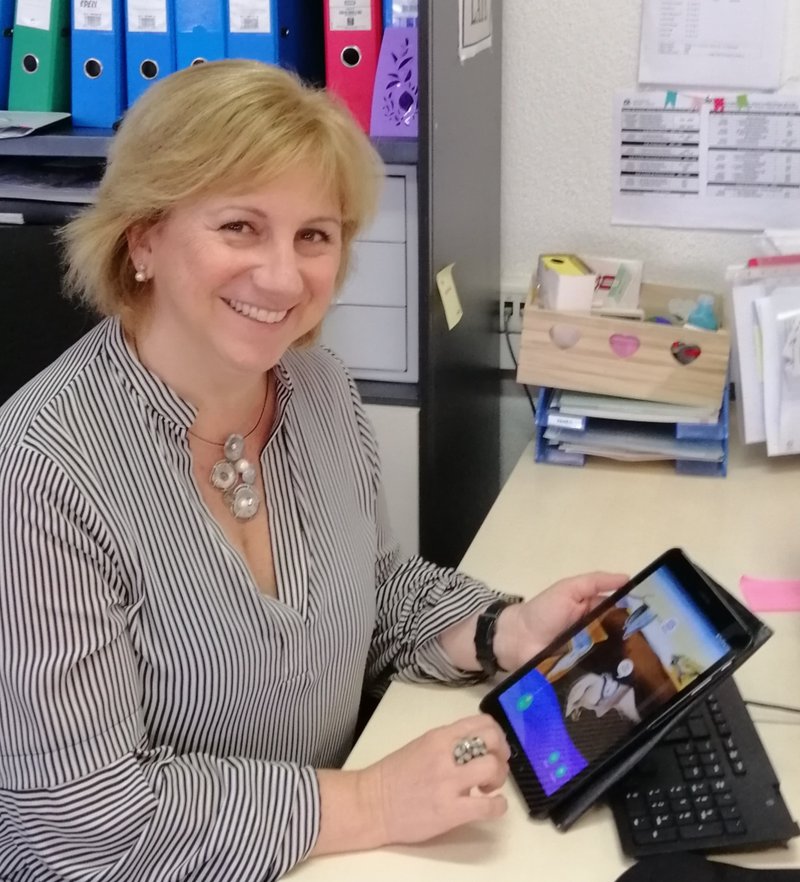The Net
Mar Gutiérrez-Colón
PHD in English Philology (URV) and head of the team developing the new Art of Reading application
Learning English through fun
Improving university students’ reading comprehension in English through games is the main aim of the new application, The Art of Reading, the result of a European project and already available for iOS and Android
What is The Art of Reading, and how does it work?
It is a free application that we have created to help improve university students’ reading comprehension in English. When you first access it, you take a test and, according to the result, you start at B1 or B2 level of the European common reference level for languages. Next, you have an academic text in English, which should be read in a limited time and then do a series of minigames related to the content of the text. The activities are based on reading strategies. For example, knowing how to scan a text, and find a phrase. When you make a mistake, the game gives you advice about reading comprehension, as the idea is for college students to get used to getting the gist of an academic text in one look, something that they find difficult to do.
Why did you create the app as a game?
Most applications for learning languages have some game aspects. We use playing a lot, because if not reading comprehension can be boring. We wanted it to be fun. Playing is a good tool for learning English.
How was the project created?
It was financed with 230,000 euros from the Erasmus + K2programme, of the European Union. To access it, you need an alliance with different institutions from a minimum of three member states, and to submit a project that has to be approved. In our case, the Rovira i Virgili University has worked with the Universitat Autònoma de Barcelona, the Wyzsza Szkola Lingwistyczna of Czestochowa (Poland), the Consorci de Serveis Universitaris de Catalunya, the Amistad IT computer company from Poland, and the Universitty of Pau et des Pays de l’Adour (France). The core of The Art of Reading was created by the URV, which led the project, and the UAB, which was in charge of the texts.
What technical aspect of the application would you highlight?
It has an open content management system (CMS). This is an online application in which we introduced the texts, activities, and so on. Because we had limited time and budget, we could not cover all academic disciplines, so we decided to focus on the texts related to the Faculty of Education. To overcome this limitation, we have decided to offer the system to any faculty that wishes to create their own app by entering their own academic texts. This will be free because it has been made with public funds and with the idea that it is an open tool.
Will there be a second part of The Art of Reading?
Yes. I have already prepared to present the second part of the project. It involves adding more languages: Spanish, French, Japanese and German, and improving some elements of the game.
What about the level of reading comprehension in English of Catalan university students?
It is very low, although in Catalonia the level of English is quite good, compared to the rest of Spain. We have not even been able to have students get to university with a B2 level, or finish university with this level. The methodology fails in schools, where there are still teachers who teach English without being specialists. In nurseries, children should already speak and sing in English. Lately, the Catalan government is making efforts to improve this situation. Nevertheless, I am teaching student teachers, who will be fabulous teachers, but who are not able to have a conversation in English.
With the Grup de Recerca Aplicada en Educació i Tecnologia (ARGET) from the URV, you are working on a solidarity project related to the app.
Thanks to the programme of the URV Solidària, we have made a version of the app for children in a school in Nairobi, Kenya, to help them learn Swahili. Participating in the project, we have Alicia Ndegwa, a teacher from that school, who did a master’s degree at the URV last year. She told us that they have a big problem there, because children who get to school speak one of the many languages in the country, but don’t know Swahili, which is the official language, and indispensible in order to integrate well. Alicia made the content in Swahili for the app, and we’ll soon travel to Kenya with a partner from the URV, to visit the school, and buy the tablets for the children. We’ll also show teachers how to use the app and the best ways to play with the children. We would like this to be a seed, and to continue to train other teachers, so this app could expand as an open tool.
technology
Leave a comment
Sign in.
Sign in if you are already a verified reader.
I want to become verified reader.
To leave comments on the website you must be a verified reader.
Note: To leave comments on the website you must be a verified reader and accept the conditions of use.




